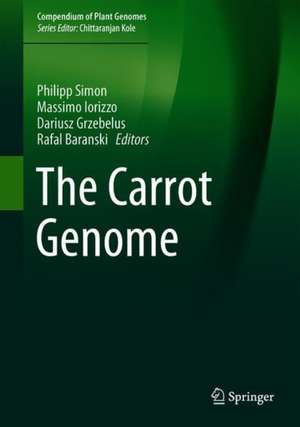The Carrot Genome: Compendium of Plant Genomes
Editat de Philipp Simon, Massimo Iorizzo, Dariusz Grzebelus, Rafal Baranskien Limba Engleză Hardback – 20 mai 2019
This book provides an up-to-date review and analysis of the carrot’s nuclear and organellar genome structure and evolution. In addition, it highlights applications of carrot genomic information to elucidate the carrot’s natural and agricultural history, reproductive biology, and the genetic basis of traits important in agriculture and human health. The carrot genome was sequenced in 2016, and its relatively small diploid genome, combined with the fact that it is the most complete root crop genome released to date and the first-ever Euasterid II genome to be sequenced, mean the carrot has an important role in the study of plant development and evolution. In addition, the carrot is among the top ten vegetables grown worldwide, and the abundant orange provitamin A carotenoids that account for its familiar orange color make it the richest crop source of vitamin A in the US diet, and in much of the world. This book includes the latest genetic maps, genetic tools and resources, and covers advances in genetic engineering that are relevant for plant breeders and biologists alike.
Din seria Compendium of Plant Genomes
- 24%
 Preț: 783.67 lei
Preț: 783.67 lei - 18%
 Preț: 948.92 lei
Preț: 948.92 lei - 15%
 Preț: 643.34 lei
Preț: 643.34 lei - 15%
 Preț: 643.84 lei
Preț: 643.84 lei - 18%
 Preț: 950.21 lei
Preț: 950.21 lei - 18%
 Preț: 956.18 lei
Preț: 956.18 lei - 18%
 Preț: 1398.00 lei
Preț: 1398.00 lei - 18%
 Preț: 1396.89 lei
Preț: 1396.89 lei - 15%
 Preț: 645.28 lei
Preț: 645.28 lei - 18%
 Preț: 1119.74 lei
Preț: 1119.74 lei - 18%
 Preț: 947.98 lei
Preț: 947.98 lei - 18%
 Preț: 954.93 lei
Preț: 954.93 lei - 18%
 Preț: 957.44 lei
Preț: 957.44 lei - 18%
 Preț: 1114.97 lei
Preț: 1114.97 lei - 18%
 Preț: 956.69 lei
Preț: 956.69 lei - 18%
 Preț: 951.91 lei
Preț: 951.91 lei - 18%
 Preț: 952.89 lei
Preț: 952.89 lei - 18%
 Preț: 952.57 lei
Preț: 952.57 lei - 18%
 Preț: 953.97 lei
Preț: 953.97 lei - 18%
 Preț: 950.33 lei
Preț: 950.33 lei - 18%
 Preț: 1228.96 lei
Preț: 1228.96 lei - 18%
 Preț: 951.77 lei
Preț: 951.77 lei - 18%
 Preț: 955.56 lei
Preț: 955.56 lei - 15%
 Preț: 643.48 lei
Preț: 643.48 lei - 15%
 Preț: 646.30 lei
Preț: 646.30 lei - 18%
 Preț: 1113.26 lei
Preț: 1113.26 lei - 15%
 Preț: 643.65 lei
Preț: 643.65 lei - 15%
 Preț: 633.53 lei
Preț: 633.53 lei - 18%
 Preț: 956.03 lei
Preț: 956.03 lei - 18%
 Preț: 951.59 lei
Preț: 951.59 lei - 18%
 Preț: 1119.56 lei
Preț: 1119.56 lei - 18%
 Preț: 1115.46 lei
Preț: 1115.46 lei - 18%
 Preț: 946.41 lei
Preț: 946.41 lei - 18%
 Preț: 950.33 lei
Preț: 950.33 lei - 18%
 Preț: 955.56 lei
Preț: 955.56 lei - 18%
 Preț: 951.77 lei
Preț: 951.77 lei - 18%
 Preț: 947.98 lei
Preț: 947.98 lei - 18%
 Preț: 1669.96 lei
Preț: 1669.96 lei - 18%
 Preț: 1114.52 lei
Preț: 1114.52 lei - 18%
 Preț: 954.62 lei
Preț: 954.62 lei
Preț: 1123.98 lei
Preț vechi: 1370.71 lei
-18% Nou
Puncte Express: 1686
Preț estimativ în valută:
215.10€ • 223.74$ • 177.58£
215.10€ • 223.74$ • 177.58£
Carte tipărită la comandă
Livrare economică 15-29 aprilie
Preluare comenzi: 021 569.72.76
Specificații
ISBN-13: 9783030033880
ISBN-10: 3030033880
Pagini: 290
Ilustrații: IX, 372 p.
Dimensiuni: 178 x 254 mm
Greutate: 0.88 kg
Ediția:1st ed. 2019
Editura: Springer International Publishing
Colecția Springer
Seria Compendium of Plant Genomes
Locul publicării:Cham, Switzerland
ISBN-10: 3030033880
Pagini: 290
Ilustrații: IX, 372 p.
Dimensiuni: 178 x 254 mm
Greutate: 0.88 kg
Ediția:1st ed. 2019
Editura: Springer International Publishing
Colecția Springer
Seria Compendium of Plant Genomes
Locul publicării:Cham, Switzerland
Cuprins
Economic and Academic Importance.- Daucus: Taxonomy, Phylogeny, Distribution.- Carrot floral development and reproductive biology.- Gene Flow in Carrot.- Carrot Domestication.- Genetic Resources for Carrot Improvement.- Carrot Molecular Genetics and Mapping.
Notă biografică
Philipp Simon, Vegetable Crops Research Unit, US Department of Agriculture Agricultural Research Service, Madison, WI, USA and Department of Horticulture, University of Wisconsin-Madison, Madison, WI, USA
Massimo Iorizzo, Plants for Human Health Institute, Department of Horticultural Science, North Carolina State University, Kannapolis, NC, USA
Dariusz Grzebelus, Institute of Plant Biology and Biotechnology, Faculty of Biotechnology and Horticulture, University of Agriculture in Krakow, Krakow, Poland
Rafal Baranski, Institute of Plant Biology and Biotechnology, Faculty of Biotechnology and Horticulture, University of Agriculture in Krakow, Krakow, Poland
Textul de pe ultima copertă
This book provides an up-to-date review and analysis of the carrot’s nuclear and organellar genome structure and evolution. In addition, it highlights applications of carrot genomic information to elucidate the carrot’s natural and agricultural history, reproductive biology, and the genetic basis of traits important in agriculture and human health. The carrot genome was sequenced in 2016, and its relatively small diploid genome, combined with the fact that it is the most complete root crop genome released to date and the first-ever Euasterid II genome to be sequenced, mean the carrot has an important role in the study of plant development and evolution. In addition, the carrot is among the top ten vegetables grown worldwide, and the abundant orange provitamin A carotenoids that account for its familiar orange color make it the richest crop source of vitamin A in the US diet, and in much of the world. This book includes the latest genetic maps, genetic tools and resources, and covers advances in genetic engineering that are relevant for plant breeders and biologists alike.
Caracteristici
Gathers up-to-date research in the first volume dedicated to carrot genetics Discusses the assembly and structure of the genome Analyzes various advanced tools and approaches, including genetic engineering and bioinformatics
